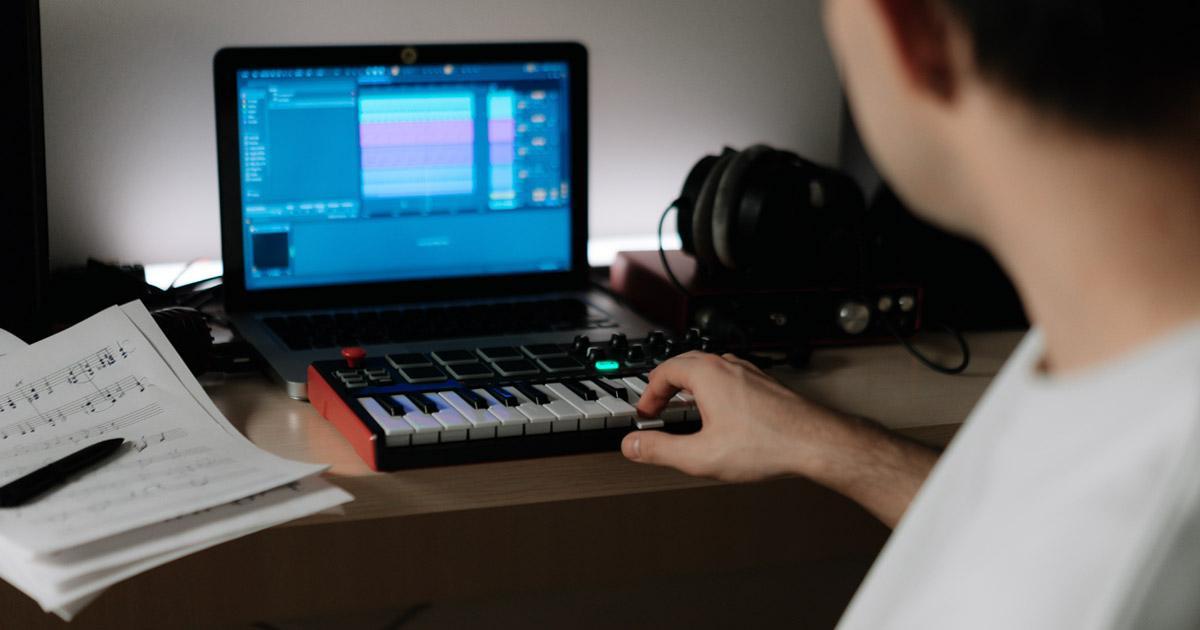How to Become a Music Composer: Exploring Your Musical Creativity

Embarking on a path as a composer opens doors to boundless artistic expression and personal gratification. However, given the fiercely competitive nature of the industry, gaining a comprehensive understanding of the composer’s role and the requisite skill set becomes crucial in determining its suitability for aspiring individuals. Fortunately, an abundance of resources and programs exist to teach you how to be a music composer. Within this piece, we delve into the essence of the composer’s profession, outline their typical responsibilities, expound upon valuable skills, furnish salary and job prospects, delineate essential requirements, and paint a vivid picture of the composer’s working environment.
What is a composer?
In music, a composer is someone who creates musical pieces with skill. They use special ways to write down music notes, making detailed guides for musicians to follow during performances. These pieces usually include instructions for different instruments or singing parts, capturing important things like melody, chords, and speed.
Composers work in various musical settings, like orchestras, bands, choirs, smaller groups, and even by themselves. Sometimes, composers team up to make music together, blending their talents to create outstanding pieces. This happens a lot in bands that write their own songs.
What does a music composer do?
The artistic process of writing and arranging music is called composition. Composers use standard musical notations that players can understand. When they write music for different instruments or voice ranges, they make sure that the notations are perfectly aligned with the needs of each player or singer. Because of this, one piece of music can have more than one set of directions, each one specific to the needs of a different musician or area.
Their tasks include:
- Tailoring music to meet the specifications of individual musicians and instruments.
- Harmoniously arranging musical pieces.
- Considering the intricate interplay of the piece’s distinctive elements.
- Providing precise instructions regarding tempo, notes, and rests.
- Crafting music that captures specific themes or evokes desired moods.
- Acquiring a foundational understanding of the instruments or vocal ranges they write for, comprehending their unique sonorities and their impact on the overall musical composition.
- Proficiency in diverse notations facilitates effective communication with performers.
- Immersion in the realm of music theory, expanding their knowledge and honing their compositional skills.
- Transcribing music to cater to various instrumentalists or vocalists, accommodating different types and ranges.
Important skills a music composer must possess
Mastering the art of composing requires the acquisition of several key skills. Here, we present a selection of skills that can help you learn how to become a successful composer:
- Proficiency in music theory: To understand how harmony, tune, beat, and form work, you need to have a strong background in music theory. This information is the foundation of your writing skills.
- Creativity and artistic expression: If you want to write original and interesting music, you need to have a huge imagination and be able to share your own thoughts. Let your imagination grow by embracing it.
- Instrumental proficiency: Learning how to play one or more musical instruments well helps you understand how each one works and what it can and can’t do correctly. This first-hand information will improve your compositions and help you talk to artists more clearly.
- Ear training and musical perception: sharpening your listening skills and training your ear to identify intervals, harmonies, and chord progressions is invaluable. A keen musical perception enhances your ability to create engaging compositions and make informed musical decisions.
- Adaptability and versatility: Being willing to try new musical styles, themes, and methods will help you come up with new songs. Being flexible and adaptable lets you change your makeup to fit different situations and people.
- Collaboration and communication: Collaborating with musicians, conductors, and performers requires effective communication skills. Your songs will be better and have more of an effect if you can clearly express your musical ideas, listen carefully, and work well with others.
- Organizational and time management skills: When you compose, you have to keep track of many tasks, due dates, and changes. Getting better at organizing things and managing your time will help you stay productive and reach your artistic goals.
- Technological proficiency: Using digital recording tools, music production software, and notation software can help you write better compositions and make the creative process go more quickly. Being familiar with the right technology tools makes it easier to try new things and come up with new ideas.
- Continuous learning and self-reflection: The path of a songwriter is one of ongoing growth and getting better. You can improve your skills and grow as an artist by having the attitude that you are always learning, asking for feedback, and thinking about your compositions.
Composer training & education requirements
For people who want to become composers and are ready to start learning, checking out music degree programs can be a great idea. Choosing a major in music, especially in composition, can open up exciting opportunities and help you learn a lot about music theory and important basics that can really boost your career. Along with getting a degree, there are some other things you can do to help you become a successful composer:
- Proficiency in music theory: Developing a solid foundation in music theory provides a framework for composing harmonically rich and structurally sound pieces. A deep understanding of musical concepts such as harmony, counterpoint, and form is essential.
- Aptitude in writing music notation: Being able to effectively communicate musical ideas through notation is crucial. Composers should possess the skill to write accurate and expressive music notation for diverse instrument types and vocal ranges.
- Cultivating originality: Nurturing a distinctive creative voice is essential for composers. Fostering the ability to generate fresh and innovative musical ideas sets them apart and enables them to create captivating compositions.
- Creating acoustically pleasing arrangements: A strong sense of orchestration and arrangement allows composers to craft compositions that are acoustically appealing. Knowledge of instrumentation, timbre, and texture aids in creating balanced and sonically engaging musical arrangements.
- Understanding instruments and vocalists: Composers greatly benefit from familiarizing themselves with the characteristics, capabilities, and nuances of the instruments or vocalists they write for. This understanding allows them to tailor their compositions to suit the unique qualities of each instrument or vocal range, resulting in more impactful and expressive music.
Become a Composer & Use Your Passion for Music to Create Wonderful Melodies
The path of a composer invites people into a world where they can express themselves through art. To start this journey, it’s important to understand the many aspects of being a composer, the different tasks they do, and the important skills they need. Aspiring composers can learn a lot and improve their skills by exploring lots of resources and educational programs.
After all, being a composer entails never stopping learning and having countless opportunities to produce art. A fulfilling path where they may share their musical ideas with others can be started by prospective composers by loving what they do, honing their craft, and maintaining inspiration.

